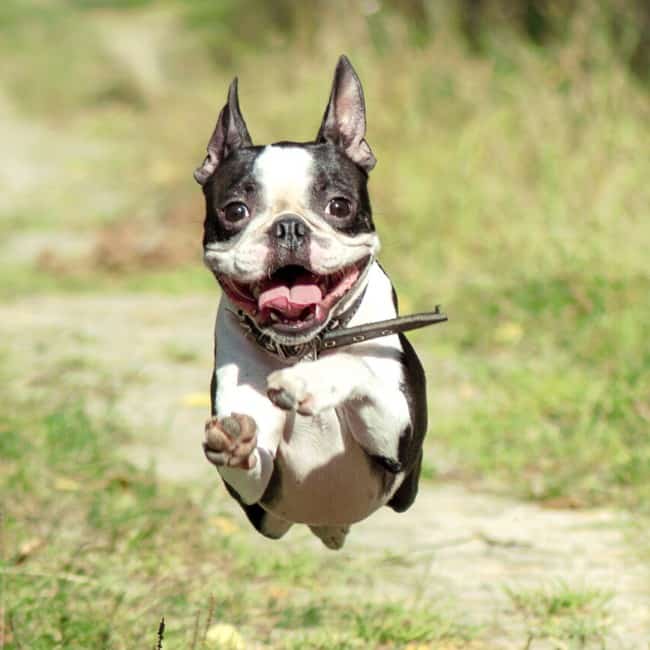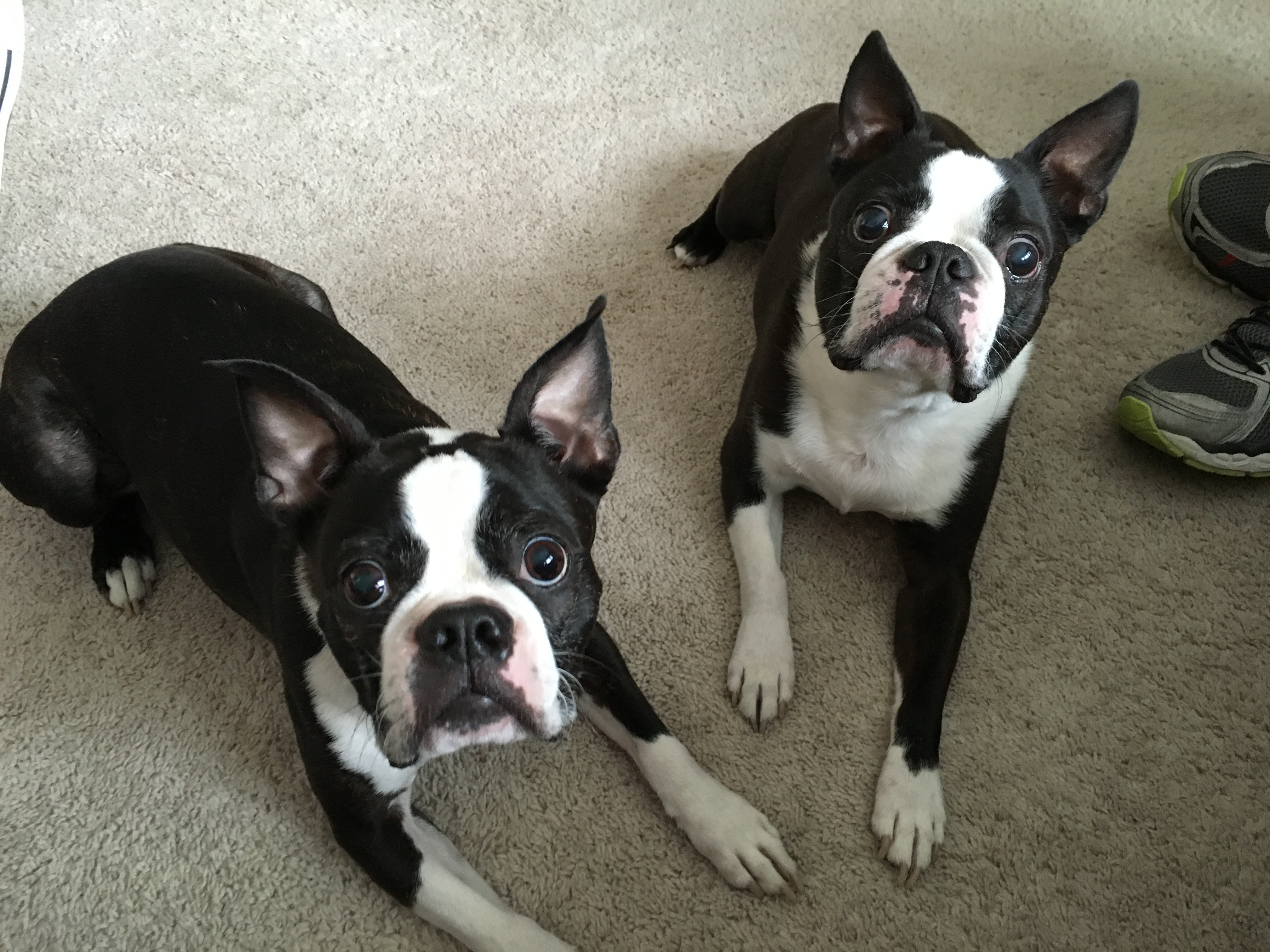If you’re wondering when Boston Terriers calm down, you’ve come to the right place! These energetic little pups are known for their playful nature, but just like all dogs, they do eventually grow out of their puppy phase. So, when can you expect your Boston Terrier to mellow out a bit?
Well, every dog is different, but generally speaking, Boston Terriers start to calm down around the age of two or three. As they mature, they become more relaxed and settle into a calmer demeanor. So, hang in there if your furry friend is still a bundle of energy – they’ll grow up sooner than you think!
Of course, it’s important to remember that even as Boston Terriers calm down, they still have their bursts of excitement. After all, they have a spirited personality that’s hard to contain! But with love, patience, and consistent training, you can help guide your Boston Terrier towards a more relaxed and well-behaved adulthood.

When Do Boston Terriers Calm Down?
Boston Terriers are known for their playful and energetic nature. As puppies, they can be quite active and require a lot of exercise and stimulation. But as they mature, many dog owners wonder when Boston Terriers will finally calm down. In this article, we will explore the different stages of a Boston Terrier’s development and provide insights into when you can expect them to become more relaxed and less hyperactive.
The Puppy Stage: Full of Energy and Playfulness
When you bring a Boston Terrier puppy into your home, get ready for an adventure. These little bundles of joy are full of energy and enthusiasm. They will bound around the house, chase toys, and engage in playful antics. It’s important to provide them with plenty of exercise and mental stimulation during this stage to help them burn off energy and prevent destructive behavior.
During the first six to twelve months, Boston Terriers will experience rapid growth and development. They will have bursts of energy and may engage in zoomies, where they sprint around the house or yard. It’s crucial to channel this energy in a positive way through structured play, training sessions, and walks. As they get older, Boston Terrier puppies will start to show signs of settling down but may still have occasional bursts of energy.
The Adolescent Stage: Finding a Balance
As Boston Terriers reach adolescence, around the age of one to two years old, they start to gain better control over their energy levels. They become more responsive to training and can focus on specific tasks for longer periods. While they may still have moments of high energy, they start to exhibit more self-control and better impulse management.
During this stage, it’s essential to continue providing regular physical exercise, mental stimulation, and positive reinforcement training. Boston Terriers are intelligent dogs and thrive when given opportunities to engage their minds. Interactive puzzle toys, obedience training classes, and agility exercises can be beneficial in keeping them occupied and helping them calm down.
The Adult Stage: Settling into a Calmer Routine
As Boston Terriers transition into adulthood, typically between two to three years old, they begin to settle into a more predictable routine. By this stage, they have likely outgrown most of their puppy behavior and have learned to control their energy levels more effectively. While they might still have bursts of excitement, they tend to become calmer overall.
At this stage, Boston Terriers require at least one to two walks per day to meet their exercise needs. Engaging in interactive play sessions and providing mental stimulation through training or puzzle toys can also help them release any excess energy. Establishing a consistent routine and providing a calm and structured environment will support their ability to relax and remain calm throughout the day.
Tips for Managing Energy Levels in Boston Terriers
While Boston Terriers naturally become calmer as they mature, it’s important for dog owners to play an active role in managing their energy levels to ensure a balanced and happy companion. Here are some tips to help you with this:
- Establish a regular exercise routine that includes daily walks and playtime.
- Provide mental stimulation through training exercises, puzzle toys, and interactive games.
- Enroll in obedience or agility classes to keep their minds engaged and provide a structured environment.
- Give them access to toys and activities that encourage independent play and keep them entertained.
- Create a calm and quiet space where they can relax and unwind.
The Importance of Patience and Consistency
Every Boston Terrier is unique, and the time it takes for them to calm down may vary. Some may reach a more relaxed state earlier, while others may take longer. It’s crucial to be patient and consistent in your training and provide them with a loving and supportive environment.
Remember, a calm and well-behaved Boston Terrier is the result of proper care, training, and attention. By understanding their developmental stages and adjusting your approach accordingly, you can help your Boston Terrier become a well-rounded and content companion.
Health Considerations for Boston Terriers
While the energy levels of Boston Terriers may change as they age, it’s essential to keep an eye out for any health issues that may affect their behavior. Boston Terriers are prone to certain conditions that can impact their energy levels, such as allergies, hip dysplasia, and respiratory problems. Regular veterinary check-ups, a balanced diet, and appropriate exercise are key to maintaining their overall health and well-being.
Training Techniques for Calming Down a Boston Terrier
If you find that your Boston Terrier’s energy levels are persistently high or they struggle to calm down, implementing specific training techniques can help. Training exercises that focus on impulse control, relaxation, and calm behavior can be beneficial. Positive reinforcement methods, such as rewards and treats, can be used to reinforce desired behavior. Seeking guidance from a professional dog trainer or behaviorist can also provide valuable insights and techniques tailored to your dog’s needs.
Key Takeaways: When Do Boston Terriers Calm Down?
- Boston Terriers usually begin to calm down when they reach around 2-3 years of age.
- Proper socialization and training from a young age can help Boston Terriers develop good behavior and become calmer.
- Regular exercise is essential to help channel their energy and prevent behavioral issues.
- Providing mental stimulation through interactive toys and puzzles can help calm Boston Terriers.
- Spaying or neutering your Boston Terrier can help reduce hormone-driven behaviors and contribute to a calmer temperament.
Frequently Asked Questions
Welcome to our Frequently Asked Questions section where we provide answers to common queries about Boston Terriers and their behavior. Here, we will address the topic of when Boston Terriers calm down. Read on to find out more!
1. Why is my Boston Terrier so hyper and when do they calm down?
Boston Terriers are known for their energetic and playful nature. As puppies, they tend to be more active and lively. However, as they grow older and reach adulthood, usually between 1 to 2 years old, they start to mellow down and become calmer.
This transition in energy levels can vary between individual Boston Terriers. Factors such as genetics, exercise, training, and overall health can influence when they calm down. Providing regular exercise, mental stimulation, and consistent training can help in managing their energy levels and aiding in their development towards a calmer temperament.
2. How much exercise do Boston Terriers need to help them calm down?
Boston Terriers require regular exercise to maintain their physical and mental well-being and to help them calm down. However, the amount of exercise needed can vary among individuals. On average, Boston Terriers benefit from around 30 minutes to 1 hour of exercise per day.
Exercise should include a combination of walks, playtime, and mental stimulation. Engaging in activities that challenge their minds, such as puzzle toys, can also help tire them out and promote a calmer state. It’s important to note that excessive exercise or overexertion can have adverse effects and potentially lead to injury, so it’s crucial to consider their age, health, and any existing medical conditions when determining their exercise routine.
3. Are there any techniques or training methods that can assist in calming down a Boston Terrier?
Yes, there are various training methods and techniques that can help in calming down a Boston Terrier. Consistency and positive reinforcement are keys to success in training and managing their behavior. Implementing obedience training, such as teaching them basic commands like “sit” or “stay,” can aid in their overall behavior and calmness.
Providing mental stimulation through puzzle toys or interactive games can also help redirect their energy and promote a calmer state of mind. Additionally, creating a calm and structured environment at home, establishing routines, and rewarding calm behaviors can contribute to a Boston Terrier’s overall sense of relaxation and contentment.
4. Can certain health issues impact a Boston Terrier’s ability to calm down?
Yes, certain health issues can potentially affect a Boston Terrier’s ability to calm down. Some health conditions, such as allergies, skin irritations, or digestive problems, can cause discomfort and restlessness, resulting in increased energy levels and difficulty in calming down. It’s important to address any potential health concerns with a veterinarian to ensure the well-being of your Boston Terrier.
In some cases, underlying medical conditions, such as thyroid disorders or hormonal imbalances, can also contribute to hyperactivity or behavioral changes. If you notice persistent hyperactivity or an inability to calm down despite appropriate training and exercise, it’s recommended to consult a veterinarian for a thorough examination and further guidance.
5. Are there certain times of the day or specific situations when Boston Terriers tend to be calmer?
Boston Terriers may exhibit calmer behavior during certain times of the day or in specific situations. Like humans, individual Boston Terriers may have their own unique patterns and preferences. Some may naturally be more relaxed in the evenings or after a good exercise session, while others may prefer quiet and calm environments.
Moreover, well-established routines and consistent daily patterns can help Boston Terriers feel more secure and relaxed. Providing a comfortable and quiet space for rest and relaxation can also contribute to their overall calmness. It’s important to observe your Boston Terrier’s behavior and adjust their environment and routine accordingly to promote a sense of tranquility and contentment.

Are Boston Terriers Hyperactive Dogs? Tips To Calm Them
Summary
Boston Terriers are energetic dogs, but they will calm down as they get older. By the age of three or four, most Boston Terriers will start to settle down and become less hyper. However, every dog is different, so some may calm down earlier or later. It is important to provide regular exercise, mental stimulation, and a consistent routine to help your Boston Terrier become more calm and well-behaved. Remember, patience and training are key when it comes to helping your Boston Terrier calm down.
Boston Terriers have a playful and lively nature, but they will eventually become more mellow with age. To help your Boston Terrier reach this calm stage, make sure to provide them with daily exercise and mental stimulation to burn off excess energy. Additionally, establishing a consistent routine and using positive reinforcement to train your Boston Terrier will contribute to their overall calmness. Remember to be patient with your furry friend as they learn and grow, and enjoy the journey of helping them become a more relaxed and content companion.
